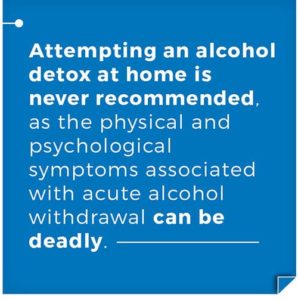- May 10
- AddictionAlcohol Addiction TreatmentTreatment
Struggling with an alcohol use disorder can be devastating to your health and your life. But if you drink heavily for years, months or even weeks, stopping suddenly can cause alcohol withdrawal symptoms – serious physical and mental side effects that occur due to the body’s dependency on alcohol. Stopping drinking is an important first step to getting your life back on track, but it’s important to do it safely and with proper alcohol withdrawal treatment.
If you or a loved one is suffering from an alcohol use disorder, Gateway can help you manage your recovery and treat the symptoms of alcohol withdrawal. Residential Treatment, Outpatient Programs, and addiction treatment programs are all available to help you take this first step toward a life free from alcohol.
Why Does Alcohol Withdrawal Occur?
Alcohol withdrawal is different from a hangover after a night of drinking: Hangovers occur because of dehydration, while alcohol withdrawal happens because your body has come to rely on regular and frequent alcohol consumption.
Alcohol affects the brain, taking over certain neurotransmitters and causing the brain to depend on it to trigger feelings of happiness. When a person with an alcohol dependency abruptly stops drinking alcohol, the individual experiences physical and mental symptoms that can be severe and even life-threatening.
What Are the Symptoms of Alcohol Withdrawal?

Symptoms of alcohol withdrawal can include sweating, rapid heartbeat, hand tremors, insomnia, nausea and vomiting, hallucinations, restlessness, agitation, anxiety and, occasionally, seizures. Symptoms can range from mild to severe and may interfere with your job, family life and daily activities. If you suffer from other health conditions or medical problems, withdrawal symptoms can be more serious.
Delirium tremens (DTs) are the most dangerous symptom of severe alcohol withdrawal. DTs are a rapid onset of confusion and delirium that usually occurs about three days after the last drink. Physical symptoms can include shaking, sweating, shivering and, in some cases, high fevers and seizures that can result in death. DTs usually only occur in people who have consumed large amounts of alcohol for more than a month.
How Long Do Alcohol Withdrawal Symptoms Last?
The alcohol withdrawal timeline starts within hours of the last drink, and it can occur over several days. According to the National Institutes of Health, mild alcohol withdrawal symptoms, such as anxiety, headaches and nausea, begin within eight hours of the last drink. The most severe symptoms, such as confusion, high blood pressure and seizures, peak within 24 to 72 hours. Symptoms typically begin to taper off after five to seven days, but they may continue for weeks.
What Is Alcohol Withdrawal Treatment Like?
Attempting an alcohol detox at home is never recommended, as the physical and psychological symptoms associated with acute alcohol withdrawal can be dangerous, or even deadly, if done without proper supervision. Gateway’s on-site medical staff has the expertise and tools to help manage the discomfort and risks of withdrawal.
While there is no cure for alcohol withdrawal symptoms, medications and tools exist to help patients manage and cope with the unpleasant effects of detoxification. The first step in detoxing is to treat the physical symptoms of alcohol withdrawal. Professionals will closely monitor blood pressure, heart rate, respiration, and body temperature to ensure they remain stable. Nutritional supplements, a healthy diet and plenty of sleep can help reduce the severity of these physical symptoms.
Three oral medications are approved by the Food and Drug Administration for treating alcohol use disorder and withdrawal:
- Naltrexone helps reduce cravings by blocking opioid receptors in the brain.
- Acamprosate helps manage long-term alcohol withdrawal symptoms by stabilizing the brain’s chemical signals that are typically disrupted by alcohol.
- Disulfiram causes an acute sensitivity to alcohol and causes many of the symptoms of a hangover immediately after it is consumed.
Medication-Assisted Treatment plus counseling and therapy are all recommended to help prevent a relapse and strive for long-term success.
What Happens After Detox?
Gateway’s Residential Treatment Program includes around-the-clock support to help keep patients safe and as comfortable as possible as they progress through the stages of alcohol withdrawal. Once qualified professionals help patients stabilize physical symptoms, coping with the mental and emotional sides of alcohol withdrawal is the next step. Anxiety, depression and suicidal tendencies can all manifest as long-term symptoms of this condition. Gateway’s therapy, counseling, and aftercare programs help patients manage these effects and increase their chances of long-term recovery.
Don’t struggle with alcohol withdrawal symptoms on your own. Call Gateway now at 877.505.4673.


